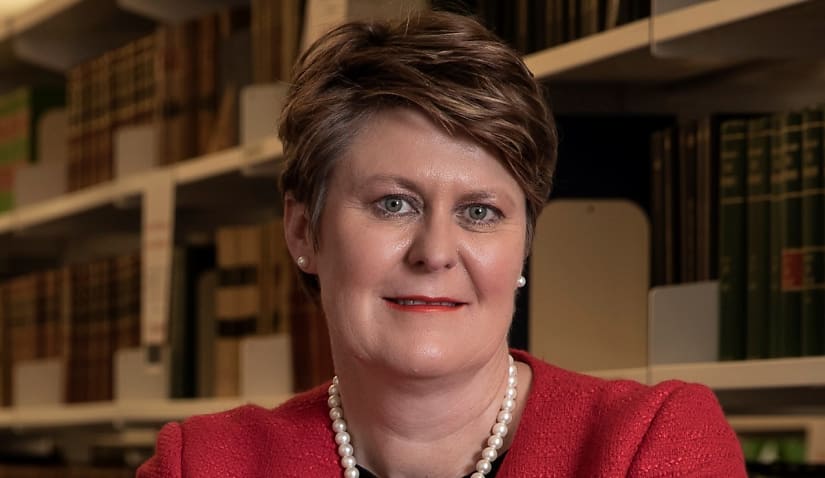In NSW, “government investment in justice infrastructure and technology has lagged behind demand”, causing issues for courts, says the state’s legal member association. Ahead of the March 2024 election, the Law Society of NSW has published its Election Platform, offering a roadmap for political parties and candidates to strengthen the justice system.

The Law Society of NSW has today (Friday, 2 December) published its 2023 State Election Platform, homing in on five key issues for reform ahead of the March vote for residents of the Premier State.
“For too long, government investment in justice infrastructure and technology has lagged behind demand, especially in our busiest courts and the growth regions of our state,” said NSW Law Society president Joanne van der Plaat (pictured).
“The Local Court of NSW and the NSW Civil and Administrative Tribunal (NCAT) are the backbone[s] of the NSW justice system, handling more than 400,000 cases annually. Both are in dire need of increased funding, especially for upgraded technology to enable non-contested and procedural matters to be conducted online.”
“The justice system is central to maintaining a stable civil society, and adequate court facilities help deliver the resolution of disputes and criminal matters with fewer delays. Justice infrastructure investments in these areas, such as South-West Sydney, should be driven by anticipated demand,” Ms van der Plaat went on.
“Our courts and legal processes can be modernised by reaping the digital benefits introduced to keep court users safe during the pandemic. People in our regions don’t deserve the geographical discrimination of post-code justice that prevents them [from] having the same access as metro residents.”
Reducing contact with the criminal justice system is also a key concern, including a greater emphasis on youth diversion and adequate access to education, implementation of Ice Inquiry recommendations, a review of how the system responds to sexual assault and improved legal training for police.
“There’s no doubt enforcing the law is an onerous duty requiring police officers to put their lives on the line every working day. We owe our probationary constables more adequate legal training so they leave the academy better equipped to ensure they discharge their responsibilities within the law,” Ms van der Plaat said.
“Better legal knowledge and improved cultural competence will help prevent or reduce complaints about police conduct, particularly when in contact with vulnerable people.”
Protecting rights and the rule of law, strengthening Indigenous justice, and better regulation to support economic recovery and resilience were also headline measures listed in the platform.
In separate comments penned in support of the platform, Ms van der Plaat wrote that the NSW Law Society always stands ready to assist the government with careful and considered input to the complex policy questions confronting society.
The issues listed in the platform constitute “quite a shopping list”, she noted, but added that the cases for these measures are reasonable and appeal to a broad cross-section of the state.
“After the election, when the time comes to implement these or any other policies, the incoming government will do well to listen to the experts. Sadly, there’ve been examples in the late stages of this government where the experts have been ignored, resulting in flawed ‘reform’,” she submitted.
“We’ve seen criminal justice amendments emerging from talkback radio and tabloid headlines, rather than considered, evidence-based reform that strengthens the justice system and improves community safety.
“These amendments were no sooner proposed by the government than waved through by an opposition hungry to share the political red meat,” Ms van der Plaat continued.
“Just one example is the near legally unworkable bail amendment requiring (in the absence of extraordinary circumstances) offenders awaiting sentence to be remanded in custody if they ‘will be sentenced to … full-time detention’.”
At first blush, that might seem sensible, she mused, “but s22B of the Bail Act is an unwarranted intrusion on the sentencing process. It almost requires judges to have the powers of a psychic. The judgments of higher courts on this provision highlight the folly of such knee-jerk responses.”
The Law Society is responsible for 38,000 solicitors across Australia’s biggest state, Ms van der Plaat reflected.
“These lawyers are on the ground every day, helping clients write a will or buy a house, keeping a troubled young person out of jail, prosecuting dangerous offenders and helping business and government operate within the law.
“The next state government will have the opportunity to build a fairer NSW. The Law Society of NSW will be ready to provide the expert input needed, to help achieve that fairness,” she concluded.
“All the next government has to do is ask.”

Jerome Doraisamy is the managing editor of professional services (including Lawyers Weekly, HR Leader, Accountants Daily, and Accounting Times). He is also the author of The Wellness Doctrines book series, an admitted solicitor in New South Wales, and a board director of the Minds Count Foundation.
You can email Jerome at: